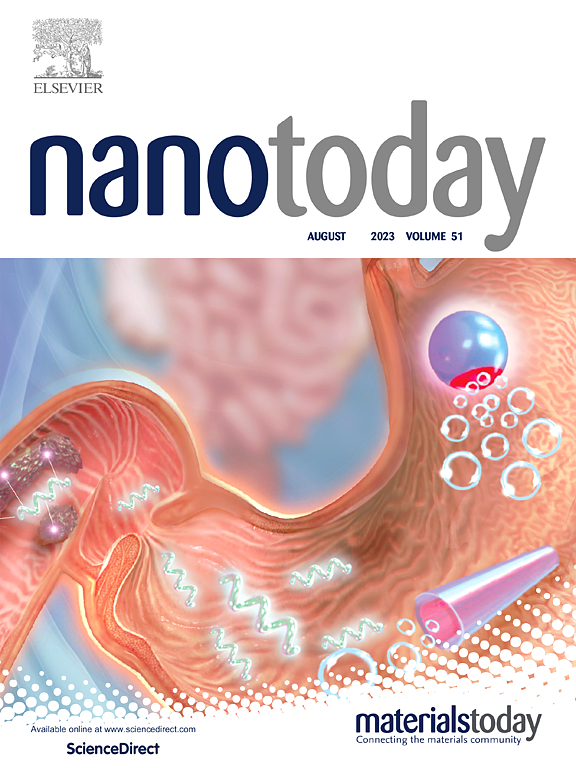Tumor cell-derived engineered exosome enhances effective immunotherapy for orthotopic glioblastoma and its recurrences
IF 13.2
1区 材料科学
Q1 CHEMISTRY, MULTIDISCIPLINARY
引用次数: 0
Abstract
Glioblastoma multiforme (GBM) is considered as one of the most lethal malignancies in the central neuron system (CNS). Despite significant advances in immunotherapy approaches for multiple tumors, the highly immunosuppressive tumor microenvironment (TME) of GBM presents critical challenges. Inspired by tumor-derived exosomes, which carry a range of tumor-associated antigens and possess improved blood-brain barrier (BBB) transcytosis, we have developed CpG adjuvant-functionalized GBM tumor-derived exosomes (Exo-CpG) to inhibit GBM proliferation and elicit long-lasting protective immunity via potent stimulation of the body's innate immunity. Our exosomal nanoplatform efficiently activates the antigen-presenting dendritic cells (DCs) in lymph nodes, promoting their maturation, and generating a strong T cell response. In combination with the anti-programmed cell death ligand-1 antibody (aPD-L1), these exosomes effectively restrain the growth of GBM in orthotopic primary GL261 and phosphatase and tensin homologue (PTEN)-deficient immunosuppressive CT2A models in immune-competent mice, significantly prolonging survival by effectively suppressing GBM recurrence. This fully natural exosomal nanoplatform offers a promising strategy for targeting the immunosuppressive TME of orthotopic primary GBM and its recurrences.
肿瘤细胞来源的工程外泌体增强了原位胶质母细胞瘤及其复发的有效免疫治疗
多形性胶质母细胞瘤(GBM)被认为是中枢神经元系统(CNS)最致命的恶性肿瘤之一。尽管多种肿瘤的免疫治疗方法取得了重大进展,但GBM的高度免疫抑制肿瘤微环境(TME)提出了严峻的挑战。受肿瘤源性外泌体的启发,这些外泌体携带一系列肿瘤相关抗原,并具有改善的血脑屏障(BBB)胞饮作用,我们开发了CpG佐剂功能化的GBM肿瘤源性外泌体(Exo-CpG),以抑制GBM增殖,并通过有效刺激人体先天免疫引发持久的保护性免疫。我们的外泌体纳米平台有效地激活淋巴结中的抗原呈递树突状细胞(dc),促进其成熟,并产生强烈的T细胞反应。这些外泌体与抗程序性细胞死亡配体-1抗体(aPD-L1)联合,在免疫功能小鼠原位原发性GL261和磷酸酶和紧张素同源物(PTEN)缺陷免疫抑制CT2A模型中有效抑制GBM的生长,通过有效抑制GBM复发,显著延长生存期。这种完全天然的外泌体纳米平台为靶向原位原发性GBM及其复发的免疫抑制性TME提供了一种有希望的策略。
本文章由计算机程序翻译,如有差异,请以英文原文为准。
求助全文
约1分钟内获得全文
求助全文
来源期刊

Nano Today
工程技术-材料科学:综合
CiteScore
21.50
自引率
3.40%
发文量
305
审稿时长
40 days
期刊介绍:
Nano Today is a journal dedicated to publishing influential and innovative work in the field of nanoscience and technology. It covers a wide range of subject areas including biomaterials, materials chemistry, materials science, chemistry, bioengineering, biochemistry, genetics and molecular biology, engineering, and nanotechnology. The journal considers articles that inform readers about the latest research, breakthroughs, and topical issues in these fields. It provides comprehensive coverage through a mixture of peer-reviewed articles, research news, and information on key developments. Nano Today is abstracted and indexed in Science Citation Index, Ei Compendex, Embase, Scopus, and INSPEC.
 求助内容:
求助内容: 应助结果提醒方式:
应助结果提醒方式:


